Yingluck Shinawatra formally took over as Thailand's first woman prime minister on August 5 after she led her party to a landslide victory in the general election.
Shinawatra is a successful businesswoman who had earlier shied away from playing an active role in politics in spite of being the sister of Thailand's controversial former prime minister Thaksin Shinawatra.
She was named as the prime ministerial candidate barely two months before the elections, but still her party Pheu Thai managed to secure a parliamentary majority.
Critics have claimed that Shinawatra is merely a proxy for her powerful brother, who is currently in exile. But she has dismissed these charges and vowed to initiate 'reconciliatory' steps to appease the rebels in this politically volatile country.
Shinawatra joins an illustrious list of powerful women leaders who rule over billions of people across the world. Let's find out more about these famous and super successful women on top...
..
Christine Lagarde, Managing Director of IMF
On July 5, Christine Lagarde became the first woman chief of the International Monetary Fund after her predecessor Dominique Strauss-Kahn was forced to step down in the wake of rape allegations against him.
Lagarde had been serving as the finance minister of France when she announced her bid for the IMF top post.
Incidentally, she was the first woman to hold the finance portfolio of a G8 country.
Lagarde has earlier managed the portfolios of trade and agriculture. Her handling of France's economy during the worst phase of recession was hailed by many.
Lagarde is a former labour lawyer who once headed a reputed international law firm in Chicago.
...
Sonia Gandhi, President of Congress party
From being the publicity-shy wife of late prime minister Rajiv Gandhi to becoming the most powerful person in a country of over one billion people, Sonia Gandhi has come a long way.
She regularly finds a mention among the most powerful politicians in the world, and with good reason.
Officially, Gandhi doesn't hold any position of authority in the government. But the government of Prime Minister Manmohan Singh doesn't take a single decision without her blessings.
Every flagship initiative of the government -- from the Right to Food bill to the Women's Reservation Bill -- bears Gandhi's personal stamp. Though she rarely makes any political statements in public, the Congress president holds the key (and the remote control) to the world's largest democracy.
...
Sheikh Hasina, Prime Minister of Bangladesh
As the ruler of one of Asia's most impoverished and politically unstable nations, Sheikh Hasina has an unenviable job on hand. A violent opposition, shocking levels of corruption in the administration and endless natural calamities add to the woes of the Bangladesh prime minister.
After serving as the premier between 1996 and 2001, her party had suffered a humiliating defeat. Sheikh Hasina was charged with a slew of accusations including murder, extortion and corruption.
Since becoming the prime minister of Bangladesh for the second time in 2008 after much tribulation, Hasina has taken the issues plaguing her nation head on. She has vowed to combat the abysmal levels of unemployment and corruption and has worked actively to improve relations with neighbouring nations.
...
Angela Merkel, Chancellor of Germany
The no-nonsense politician has been the most powerful woman in Europe for years. Chancellor of Germany Angela Merkel has not only been voted the Most Powerful Woman in the world for four successive years (2006-2009) by Forbes, she has also served as the president of the European Council and the formidable G8.
The 'Iron Frau' has ruled Germany for over six years and managed to hold her own against the world's most powerful leaders.
The United States administration recognised Merkel's contribution to maintaining the fragile equations in world politics by honouring her with the Presidential Medal of Freedom. The Indian government conferred the Jawaharlal Nehru Award for International understanding to Merkel in May 2011.
...
Hillary Clinton, Secretary of State of US
She missed out on the presidency of the United States after being beaten to the post by the charismatic Barack Obama. But Hillary Clinton readily accepted the second most powerful position in the US administration: Secretary of State.
Clinton has lived up admirably to her challenging role; she has repaired ties with many nations estranged during the disastrous tenure of George W Bush.
She has also exhibited a tougher side; Clinton was the only woman in the control room at White House that monitored the operation that killed Osama bin Laden in Abbottabad, Pakistan.
Once best known as the betrayed wife of her philandering husband, former US President Bill Clinton, she is today considered the most formidable woman politician in the world.
...
Aung San Suu Kyi, Myanmar political rebel
On November 13 last year, Aung San Suu Kyi was released from house arrest by the pro-junta government of Myanmar for the first time in eight years.
Suu Kyi, an icon for pro-democracy and human rights activism, had spent 15 of the last 20 years of her life under various forms of imprisonment for speaking up against the ruthless regime of the junta.
The Myanmar government released Suu Kyi as part of its 'pro-democracy' measures, but her supporters fear that she might be arrested again soon.
Since her release, the ailing leader has maintained a low profile, while her party National League for Democracy continues its fight against the despotic government.
...
Cristina Fernandez de Kirchner. President of Argentina
Fernandez's four-year rule has attracted an equal number of detractors and supporters. She will face her litmus test in October this year -- when Argentina goes to polls -- without her beloved husband by her side. Kirchner died in October last year after suffering a heart attack.
While her counterparts in India and United States prefer to stick to an elegant but simple dressing style, Sanchez is notorious for her penchant for the latest fashion. She is never seen in public without high heels and make-up and reportedly never repeats the same outfit twice.
...
Julia Gillard, Prime Minister of Australia
In June last year, Julia Gillard ousted beleaguered Australian prime minister Kevin Rudd to become the first woman premier of the country.
A lawyer by profession, Gillard started dabbling in politics while studying at the University of Adelaide. She had been in charge of the ministries of immigration and health before she made a bid for the post of the PM.
Gillard is a veteran parliamentarian who is known for her debating skills. She has declared that education and health sectors will remain her main focus during her tenure.
...
Mary McAleese, President of Ireland
Lawyer-turned-politician Mary McAleese has ruled Ireland for nearly 14 years since being elected for the first time in 1997. In 2004, she won the presidential re-election without any contest; opposition parties couldn't even find a candidate to stand against the immensely popular leader.
McAleese is one of the few world leaders who have openly supported homosexual law reforms and criticised the Catholic Church's attitude towards it.
Known for her skilful handling of foreign relations, McAleese hosted the Queen of England in May 2011; it was the first visit by a British monarch to the Republic of Ireland in the history of the nation.
...
Ellen Johnson Sirleaf, President of Liberia
The only female head of state in Africa, Ellen Johnson Sirleaf is a reputed economist who has worked in various prestigious financial institutions including the World Bank.
She was working as the finance minister of Liberia when a bloody coup ousted the government in 1980. While almost all the other cabinet members were shot dead, Sirleaf managed to flee to the United States.
In the following years, Sirleaf made several attempts to return to her country. But each time, she was forced to leave, imprisoned, or sent into exile.
At the end of the Liberian Civil War in 2005, Sirleaf returned to her country and won the general election by a narrow margin to become the president.
...
Roza Otunbayeva, President of Kyrgyzstan
Roza Otunbayeva took over as the interim president of Kyrgyzstan at a time when the Central Asian republic was torn apart by riots in June, 2010. Her predecessor Kurmanbek Bakiyev had fled to Belarus to escape violent protests against his autocratic rule, leaving the country in a state of anarchy.
The former Communist leader has been successful in ending the bloody clashes between majority ethnic Kyrgyz and the minority Uzbek communities.
Otunbayeva had earlier served as Kyrgyzstan's first envoy to the United States. She has also worked with the United Nations and served as a legislator in the politically turbulent nation.
...
Dilma Rousseff, President of Brazil
A former Marxist guerrilla, Dilma Rousseff took charge as the president of Latin America's biggest nation in January, 2011.
In the early 1970s, Rousseff was imprisoned and brutally tortured for being a Marxist sympathiser and the member of a revolutionary group.
After the end of the military regime, she went back to college and graduated in economics. She soon joined politics and made a mark as Brazil's energy secretary, increasing the country's power production manifold through her policies.
Dilma was handpicked by her predecessor Luiz Inacio Lula da Silva to take over the reins of one of the world's fastest growing economies.
...
Tarja Halonen, President of Finland
Yet another lawyer-turned-politician, Tarja Halonen has been involved in politics since her student days. She is a veteran parliamentarian who became the first woman to rule Finland after her election in 2000.
With an impressive job approval rating of over 85 per cent, Halonen was re-elected in 2006.
She has been hailed for her campaign for the preservation of human rights and women's rights across the world and was considered a likely candidate for the post of the United Nations secretary general. Halonen has indicated her willingness to take up the coveted position after she steps down as Finland's president.
...
Kamla Persad-Bissessar, Prime Minister of Trinidad and Tobago
She became the first woman to head the nation of Trinidad and Tobago in May, 2010. Before joining politics, Kamla Persad-Bissessar enjoyed a successful academic career, working as a college lecturer in several institutes.
Not only does she hold degrees in law and business management, Persad-Bissessar has also occupied high-profile posts like that of the attorney general and the leader of opposition before taking up the top job of PM.
...
Dalia Grybauskaite, President of Lithunia
It is not surprising that the woman known as the 'Iron Lady of Lithunia' looks up to former United Kingdom prime minister Margaret Thatcher as her political idol.
The no-nonsense Dalia Grybauskaite earned the sobriquet partly for the black belt that she holds in karate. A former Communist leader, she has served as Lithunia's finance minister and participated in the country's negotiations with the World Bank and the International Monetary Fund.
Grybauskaite also enjoyed a successful stint at the European Union where she was in charge of financial programming and budget.
She became the first woman to rule Lithunia after securing a landslide victory in July, 2009.
...
Laura Chinchilla, President of Costa Rica
Like many of her contemporaries in this feature, Laura Chinchilla is the first woman to head the Central American country.
After serving as the vice president and the minister of justice in previous administrations, Chinchilla took charge as the president of Costa Rica in May, 2010.
Chinchilla has adopted a noticeably conservative stance on several issues including disassociating religion from governance, homosexual marriages and abortion. Her opposition to these measures has been criticised by international human rights organisations.
...
Iveta Radicova, Prime Minister of Slovakia
Iveta Radicova was a well-known social worker who ran her own NGO before she joined politics and became a member of Parliament in Slovakia.
She became the former Communist nation's first prime minister in July, 2010, while it was still battling with the devastating effects of recession. Radicova has taken several measures to reduce budget deficit and tackle the financial crisis to make Slovakia one of Europe's fastest growing economies.
...
Jadranka Kosor, Prime Minister of Croatia
Even before she became Croatia's first woman prime minister, Jadranka Kosor boasted of a colourful career graph. She holds a degree in law, has worked as a war correspondent and even published two books of poetry.
Kosor's popularity has fluctuated wildly since she came to power in July 2009, yo-yoing between extremely favourable and absolutely dismal. Her administration has taken several unpopular steps, including hiking taxes, to fight the economic slump.
Her bold step of firing dozens of government officials over charges of corruption did receive some accolades, but the staggering rise in unemployment during her term may mar her chances of getting re-elected.
...
Johanna Sigurdardottir, Prime Minister of Iceland
She is longest serving parliamentarian in the history of Iceland and had served as the minister of social affairs for several years.
Johanna Sigurdardottir is also the world's first openly homosexual head of state.
Siguroardottir took over as the PM in 2009, when Iceland was going through a tumultuous phase due to the global meltdown and crippling inflation rates. She was elected to the top post due to her favourable approval ratings and sound Left-liberal policies.
Siguroardottir, a former flight attendant, has been married to her partner Jonina Leosdottir since 2002.

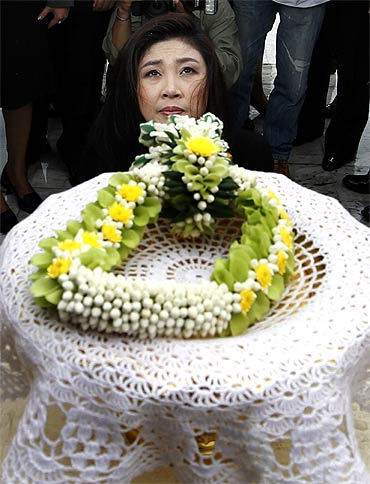
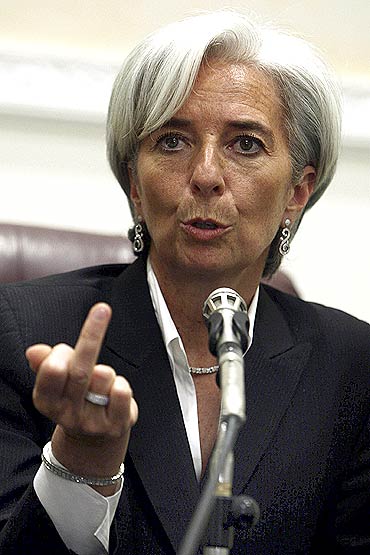
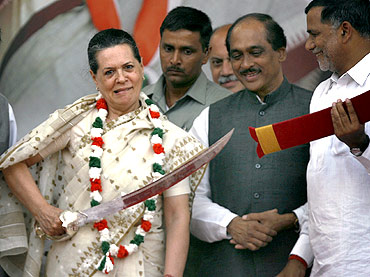
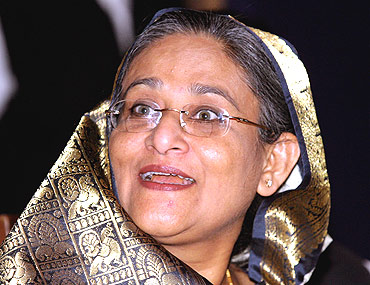

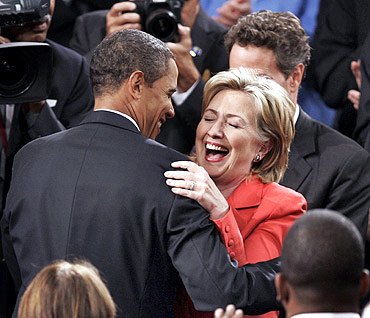
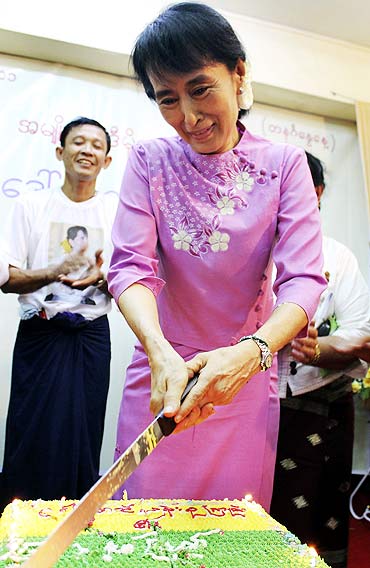
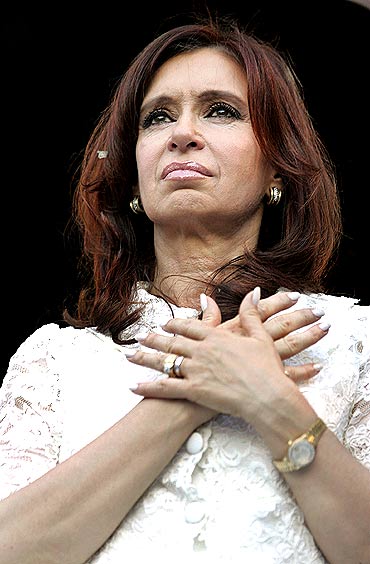
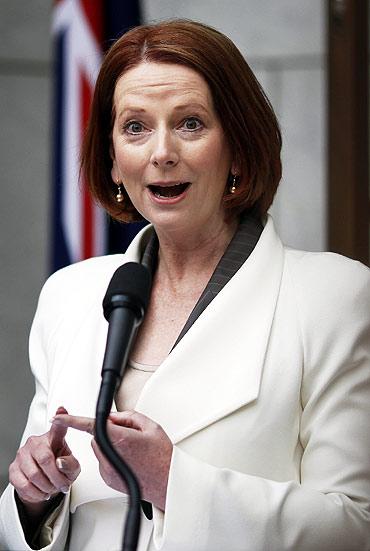
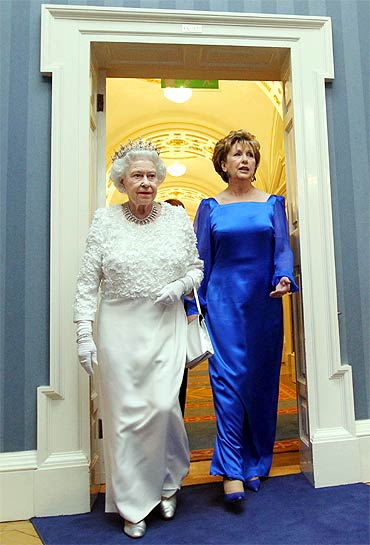
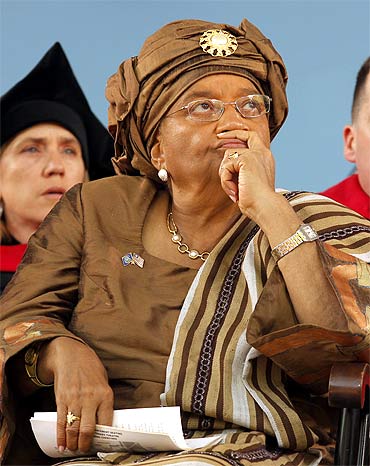
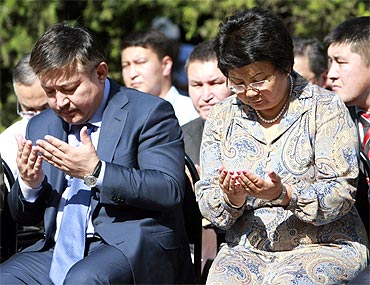
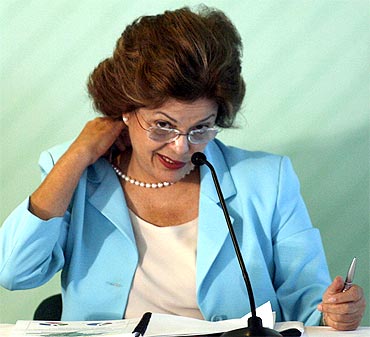
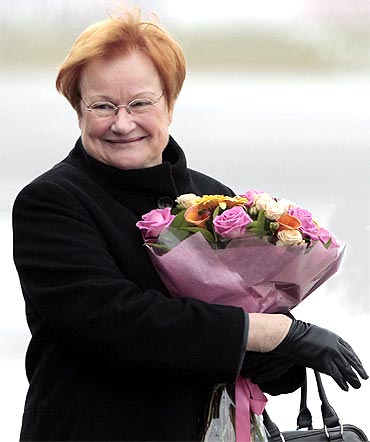
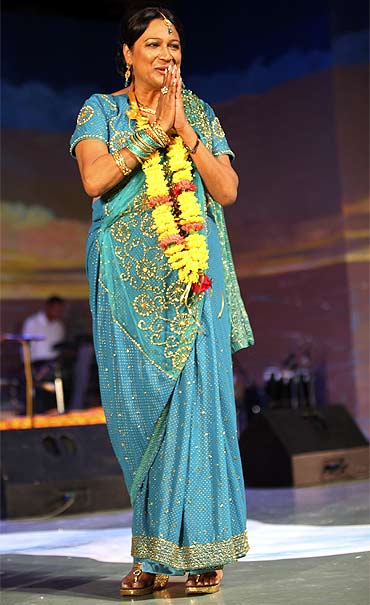

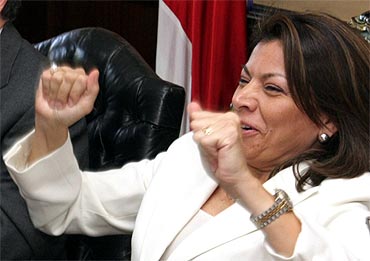
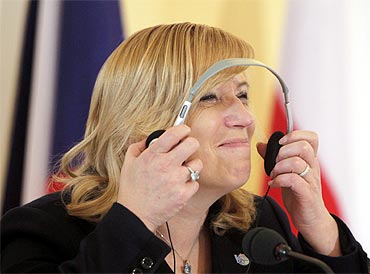
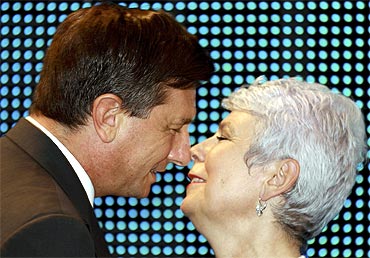

article